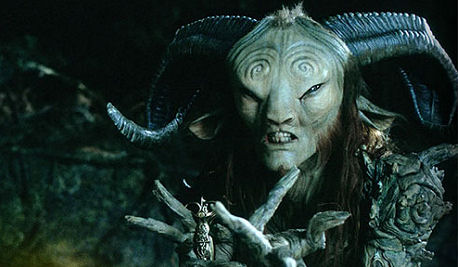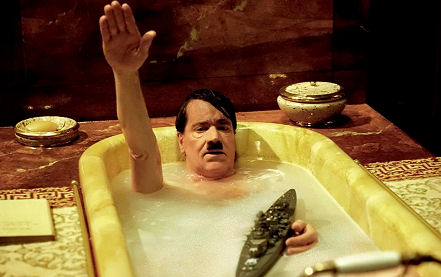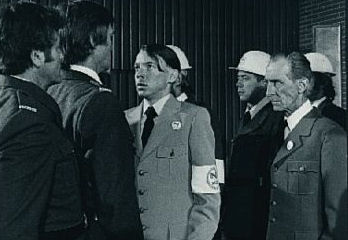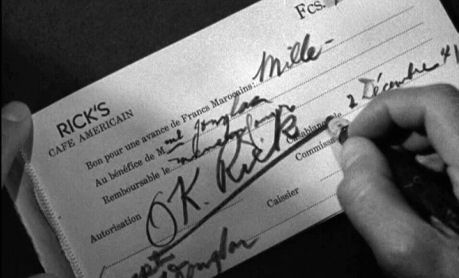wired
Newman, Solo Jump Ship
The news came down this afternoon that ICM agents Robert Newman (the hepcat indie-world guy who reps cool-out-of-school directors like Guillermo del Toro, Baz Luhrman, Robert Rodriguez, etc.) and Matt Solo (nephew of Napoleon, related on his mother’s side to Han) had jumped ship and joined Endeavor as partners. Deadline Hollywood Daily‘s Nikke Finke got the story — “more fall-out from ICM’s recent merger with Broder Webb Chervin Silbermann,” she reasons, plus the apparent fact that Endeavor’s “on a roll.”
“Pan’s” Deal
Just got out of the 8:20 pm showing of Pan’s Labyrinth at the Lincoln Plaza, and there was no missing the fact that the crowd was enthralled, captivated…until the very sad, somewhat dispiriting ending. This is a very sensual, obviously transporting dream movie, but director-screenwriter Guillermo del Toro‘s story plays as it does because, deep down (or so I believe), his hatred of Sergi Lopez‘s Captain Vidal (i.e., wanting to see him beaten down, sliced open and destroyed for his black monstrousness) is stronger than his feelings of love and tenderness for Ivana Baquero‘s Ofelia, although those feelings are obviously considerable.
Haynes, Dylan, Harvey
Bob Dylan isn’t suing anyone over Factory Girl — Hayden Chistensen‘s Dylan-xeroxed “Quinn” character is the only guy in the film who really cares for Sienna Miller‘s Edie (apart from Shawn Hatosy‘s Cambridge pally) plus he advises her to steer clear of Warhol and his vampires. Still, it’s a wee bit ironic that Todd Hayne‘s I’m Not There, an ostensibly heavy examination of the Dylan mystique/legend, is being distributed by the Weinstein Co. I mean, considering that somebody from the Weinstein camp fed “Page Six” that recent item about Dylan having allegedly gotten Sedgwick pregnant (i.e., according to her brother).
Casablanca date
I happened across a DVD Beaver frame capture from Casablanca this morning, and for the first time ever noticed the date on the lower right corner of the payment receipt — December 2, 1941. In other words, the Casablanca story is unfolding only three or four days before the attack on Pearl Harbor, which obviously intensified matters all around, at least as far as Americans were concerned.
The Oscar-winning Michael Curtiz film was, I believe, shot in early ’42 and released in late November of that year. (Oddly, it didn’t open in Los Angeles until January 1943.) Interesting that Curtiz (or his production designer or set dresser) envisioned the action happening right before the Japanese attack rather than, say, early or even mid ’42. This isn’t an earth-shaker, I realize, but has anyone else caught the date before?
Talladega eat-me
A certain columnist today named Talladega Nights: The Ballad of Ricky Bobby as the fifteenth best film of 2006… yeegodz! Champagne-toasting a comedy of this calibre (which I suffered through like a cancer patient) and trying to lift it up to pseudo-best of the year status is an old movie-journalist ruse — it makes you look ahead-of- the-curve to bestow serious praise on what others have derided as a crude, run-of-the-mill culture-war comedy.
Pan’s Numbers
Then: Ang Lee‘s Crouching Tiger, Hidden Dragon — a very big hit by any standard, let alone for a foreign-language film — opened on 16 screens on 12.8.00, and earned $758.542 after four days. Now: Guillermo del Toro‘s Pan’s Labyrinth opened on 12.29 on 17 screens and has earned $779,427, averaging $44,148 per screen.

The expectation is that Pan’s will have its first million in the coffee can by the end of today, or certainly by sometime tomorrow. Congrats to Picturehouse’s Bob Berney, but what are readers deducing from these figures? The deep-forest fantasy drama opens in…well, it’s already opened in L.A. but Chicago and maybe somewhere else on Friday. It will expand to roughly 100 screens by 1.12.
PGA Best Picture noms
The Producers Guild of America today improved the Oscar odds of Alejandro Gonzalez Inarritu‘s Babel, which had been seen by some handicappers as somewhat pummelled and rope-a-doping over the last three or four weeks, by naming it as one of the PGA’s five Best Picture nominees.
The other four, no real surprises, are Martin Scorsese‘s The Departed, Bill Condon‘s Dreamgirls, Jonathan Dayton and Valerie Faris‘s Little Miss Sunshine and Stephen Frears‘ The Queen.
The obviously stellar and worthy United 93, Children of Men and Letters From Iwo Jima haven’t necessarily been hurt by being excluded, but let’s face it — they haven’t been helped. For what it’s worth, 11 of the previous 15 PGA winners have won the Best Picture Oscar.
The 3,000 member-strong org will announce the winner on 1.20 (while ev erone’s up at Sundance) at L.A.’s Century Plaza hotel.
Nominated producers are Inarritu, Steve Golin and Jon Kilik for Babel, Graham King for The Departed, Laurence Mark for Dreamgirls, Marc Turtletaub, David T. Friendly, Peter Saraf and Albert Berger and Ron Yerxa for Little Miss Sunshine and Andy Harries, Christine Langan and Tracey Seaward for The Queen.
Chocano on “Sunshine”
“What was Little Miss Sunshine if not a brilliant ontological dissection of the perils of sublimation? Every one of the characters is undone by the pressure to conform to the entertainment- celebrity complex ideal, to find a suitable success shape that will justify their existence to the world — everyone but the Alan Arkin character, who chooses hedonism.
“What I love about Little Miss Sunshine are the philosophical questions it raises about how we live, how we should live, how we should be.” — Carina Chocano posting in Slate‘s Movie Club.
“Undone” but not beaten. Paul Dano‘s “Dwayne” character gets past his obsession with being an Air Force jet pilot by the end of the film. And isn’t Steve Carell‘s “Frank” pretty much divested of any success dreams at the get-go, having tried and failed to commit suicide and barely able to lift a half-enthusiastic eyebrow about anything? The nice thing is that he’s in pretty good spiritual shape by the end of the Sunshine journey.
Hitler funny hah-hah
Dani Levy‘s Mein Fuehrer: The Truly Truest Truth about Adolf Hitler, which opens in Germany on 1.11, is described in this story by the AP’s Berlin-based Geir Moulson as “treading ground that once would have been off-limits…a German movie that dares to treat Hitler as comedy.”

Levy’s plot “starts in December 1944, with Berlin in ruins and Hitler (Helge Schneider) too depressed to deliver a much-awaited speech to rally his people,” Moulson relates. “His propaganda minister, Joseph Goebbels (Sylvester Groth), finds a solution in Adolf Gruenbaum (Ulrich Muhe, star of The Lives of Others), a fictional Jewish actor who coached Hitler at the beginning of his career and is now in a concentration camp.
“‘We need someone who can ignite our Fuehrer’s greatest strength — and that strength is his hatred,’ Goebbels explains.
“Gruenbaum uses the mission to try to kill Hitler, but fails. So he puts him through humiliating exercises, such as crawling about barking like a dog. The farce broadens when Hitler’s barber accidentally shaves off half his mustache; the enraged dictator shouts himself hoarse and Gruenbaum has to lip-sync the big speech, but deviates from the script to make Hitler look even sillier.”
Comedies dealing with war and Holocaust-related subjects — a Hamburg stage musical called Mein Ball, about Hitler trying to save Germany by staging the World Cup, plus Roberto Begnini‘s Life is Beautiful and Mel Brooks‘ “Springtime for Hitler” sequence in The Producers — are mentioned as having paved the way for Levy’s film, but what about the all-but-forgotten Hitler’s Son, the unfunny 1978 comedy staring Bud Cort and Peter Cushing?

Actually, there was something funny about that film — the copy line on the one-sheet: “Vee haff vays of making you laugh.”
Carr goes postal
“Because President Bush declared Tuesday a national day of mourning [because of ex-President Gerald Ford‘s passing], the United States Postal Service did not deliver mail. No big deal right? Except that yesterday was the deadline for ballots to be returned to the Producer’s Guild of America and the Screen Actors Guild for their respective film awards. And those Oscar screeners that were coming out at the end of the year spent a day somewhere deep in the bowels of the postal system.” — N.Y. Times guy David Carr (a.k.a., “the Bagger”) on the fretting and running around that happened as a result.
Kansas City, Austin go for “United 93”
Both the Kansas City Film Critics Circle (KCFCC…sounds like Kentucky Fried Chicken) and the Austin Film Critics have named United 93 as their Best Film of the Year. Will the Academy cowards who’ve refused to see this film heed this latest hosannah, or are they digging their heels all the more with each new award it receives? Can the delicate finessings of Universal Oscar consultant Tony Angelotti achieve the impossible and persuade them to at least watch it?


